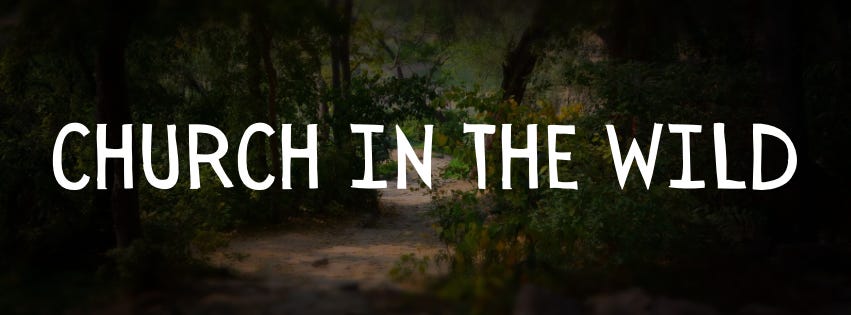⛪︎ Church in the Wild
A Primer on Acts and the Power of Witness
“Throughout the church’s history, Acts has been called a contemporary text. In every time it speaks to the current realities of the church in the world.”—Willie James Jennings
Each year, our church rallies around a theme. It helps us to align our preaching, programming, and practices around a central idea that coincides with our overall mission.
This year’s theme is Radical Witnessing.
A witness is someone who testifies to the truth.
We are not judges.
We are not attorneys.
We are witnesses.
Later this month, we’ll begin the “magnum opus” of Radical Witnessing, a series called Church in the Wild.
It’s our deep dive into the book of Acts, the story of how ordinary people, filled with extraordinary power, bore witness to Jesus in hostile territories around the world.
Consider this month’s article a primer for the weeks ahead as we explore Acts and the power of witness.
From the Gospels to the Book of Acts
When most people think of Jesus, they think of the Gospels, which tell the story of his life, highlighting his teachings, miracles, crucifixion, resurrection, and ascension.
But there’s another story, a story just as vital that often gets overshadowed.
It’s the story of what happened next.
What happened after Jesus ascended?
What happened to the people who followed him?
And how did a small, marginalized community on the edge of an empire become a global movement that has shaped the world for 2,000 years?
Those questions bring us to the Book of Acts.
In my former book, Theophilus, I wrote about all that Jesus began to do and to teach until the day he was taken up to heaven, after giving instructions through the Holy Spirit to the apostles he had chosen. After his suffering, he presented himself to them and gave many convincing proofs that he was alive. He appeared to them over a period of forty days and spoke about the kingdom of God.
Acts 1:1-3 NIV
From Admiration to Imitation
For the early church, following Jesus wasn’t just about believing in him; it was about becoming like him. Upon his ascension, his words weren’t preserved in a museum for safekeeping. They were practiced as marching orders by those who had pledged their allegiance to the risen King.
They preached the same kingdom.
They healed with the same power.
They confronted the same injustices.
They endured the same persecution.
And they lived with the same Spirit.
In doing so, they turned the world upside down.
But when they did not find them, they dragged Jason and some brethren to the rulers of the city, crying out, “These who have turned the world upside down have come here too.
Acts 17:6 NKJV
Between Now & Then
We are not the first people to live in a hostile culture.
To gather in homes in Acts was an act of rebellion.
We are not the first people to be pushed to the margins.
To follow Jesus in Acts was to live on the margins.
We are not the first people to live under the threat of nationalist empires.
To say “Jesus is Lord” in Acts was to say “Caesar is not.”
That’s why this study of Acts matters.
It will remind us that the Church is at its best when it remembers who she is, not an institution to be protected but a people to be empowered. Not an event to attend but a movement to embody. Not a brand to promote, but a witness to bear.
But you will receive power when the Holy Spirit comes on you; and you will be my witnesses in Jerusalem, and in all Judea and Samaria, and to the ends of the earth.
Acts 1:8 NIV
Church in the Wild officially kicks off at Kingdom South on Sunday, October 19th.
Consider this your invitation into the mystery and the movement.
If the Gospels show us the way of Jesus, Acts shows us the way forward.
Let’s go where the wild things are!
If this resonated with you, would you consider sharing it with someone else?


